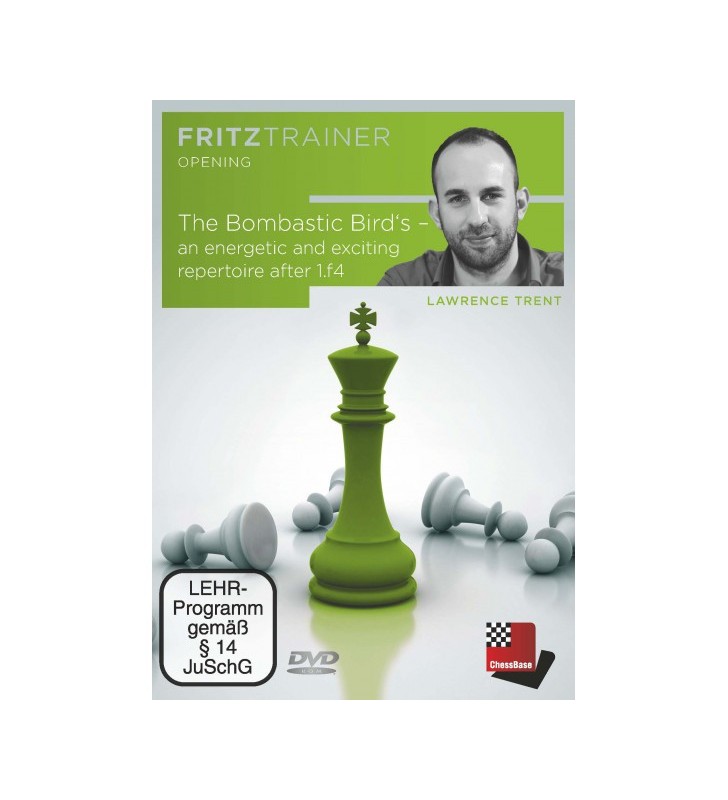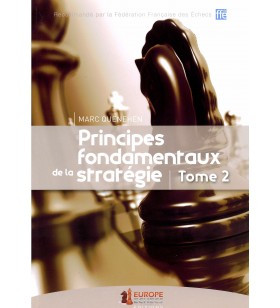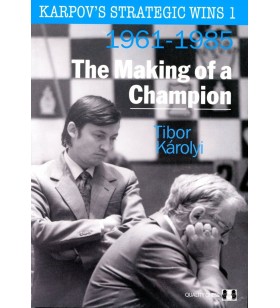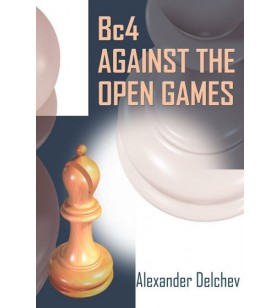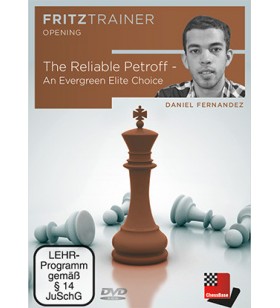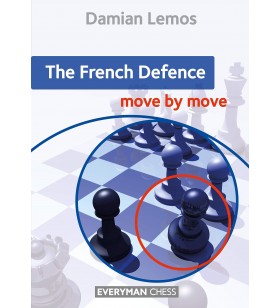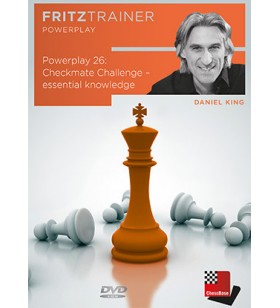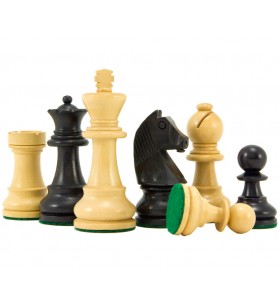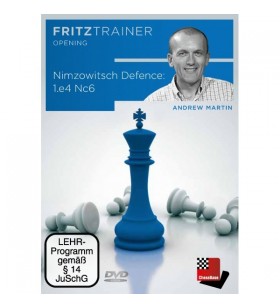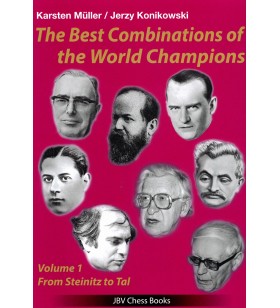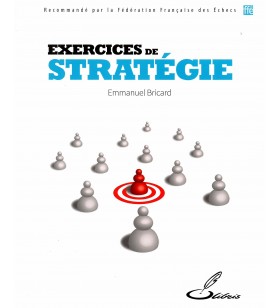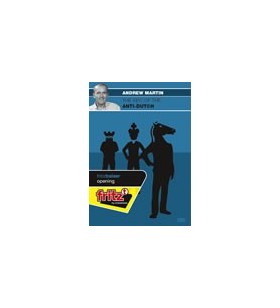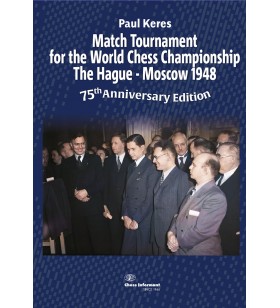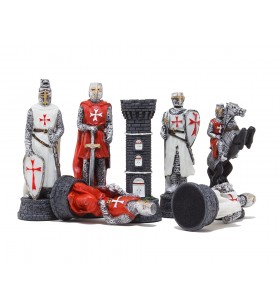- CHESS
- Chess boards and pieces
- Chess books
- Chess books in English and others
- Opening books
- The Ruy Lopez
- Other open games
- Other semi-open games
- The Sicilian
- French Defence
- Pirc & Modern Defence
- Caro-Kann
- Queen´s Gambit
- Slav Defence & Semi-Slav
- Other closed games
- Other semi-closed games
- King´s Indian Defence
- Nimzo & Queen´s Indian
- Grünfeld
- English Opening
- Dutch Defence
- Miscellaneous openings
- General and repertoire books
- Endgame books
- Books on grandmasters
- Books on tournaments
- Books in Dutch
- Miscellaneous
- Chess magazines
- General and middle game books
- Opening books
- Chess books in French language
- Chess books in English and others
- Chess software and DVDs
- Chess computers
- Equipment for clubs
- BOARD & BRAIN GAMES
- GO
- BRIDGE & CARDS & TAROT
- POKER & CASINO GAMES
- PUZZLES & BRAIN TEASERS
- DARTS
Trent - The Bombastic Bird's DVD
 Livraison sous 48 heures via Bpost*
Livraison sous 48 heures via Bpost*
Livraison gratuite à partir de €69 (Belgique, France, Pays-Bas, Luxembourg, Allemagne)
 You can cancel your order
You can cancel your order
For fourteen days!
 Secure payments
Secure payments
All payment cards accepted.
16 other product
Chess Set Stauton Classique Black
Classic set of chess pieces Stauton ebonised.
They are weighted and felted for perfect balance making them a robust and elegant set that is perfect for all levels of players. It is also worth noting that each chess pieces is hand carved and turned, in a production process that takes weeks.
Materials: Boxwood, Ebonised Boxwood
This set of pieces goes perfectly with this set
Size of the king is 85 mm height
FTACNICK, KOPEC, BROWNE - Champions of the New Millenium
18 champions, quatre parties commentées par tête de pipe, histoire de faire connaissance : l'idée n'est pas nouvelle, mais le résultat toujours intéressant pour qui ne suit pas au jour le jour l'actu échiquéenne. Reste que le choix, tant des joueurs (la quasi-retraitée Judit Polgar dans les champions du nouveau millénaire ?) que des parties (quatre parties des années 90 pour Anand) pose question, et se révèle décevant pour le public français - Mamedyarov mais pas Bacrot, Karjakin mais pas Vachier
KASPAROV - My Great Predecessors part I
Deux des plus forts joueurs de notre temps (je veux dire Kasparov et Fritz, puisque l'ex-champion du monde ne fait pas mystère d'utiliser abondamment l'aide de l'informatique) se penchent sur les accomplissements des champions du passé. Ce premier volume passe en revue un bon siècle de l'histoire du jeu, du premier championnat du monde officieux (McDonnell-La Bourdonnais 1834) à la mort d'Alekhine (1946), sautant bizarrement la parenthèse Euwe (1935-37) gardée pour le deuxième tome. Comme son titre et sa couverture l'indiquent, l'ouvrage se focalise sur les quatre champions du monde officiels, mais les auteurs prennent le temps de nous parler un peu de leurs principaux adversaires, avec tout de même quelques négligences regrettables (Maroczy représenté simplement par une fin de partie perdue...). Par la force des choses, les parties présentées (117, plus une trentaine d'extraits) sont en général archiconnues, mais elles ont bénéficié d'un travail d'annotation fouillé, utilisant tant l'oeuvre des commentateurs passés que les ressources de la technique moderne, esquissant ainsi une sorte de mise en perspective de l'histoire des échecs. Osons tout de même deux petites critiques (ce qui fera donc trois au total) à l'encontre de ce bel ouvrage : la mise en page un peu négligente, qui rend la lecture de certaines parties un peu laborieuse, et la présence d'une introduction superflue où Kasparov se répand en considérations politico-historiques passablement filandreuses - tout homme, quelle que soit son intelligence, devrait se cantonner à sa spécialité... Un dernier détail : comme le livre s'achève inévitablement par un rappel (honnête mais un peu édulcoré) des agissements d'Alekhine durant la Seconde Guerre Mondiale, signalons que l'historien Ken Whyld vient de rééditer une plaquette contenant les articles antisémites écrits pour le Pariser Zeitung, accompagnés d'une introduction faisant le point sur l'affaire (Alekhine Nazi Articles).
Keres - Match Tournament for the World Chess Championship The Hague-Moscow 1948 - 75TH ANNIVERSARY EDITION
This book is dedicated to the match-tournament of 1948, which gave rise to the first Soviet World Champion - Mikhail Botvinnik. The main content of the book is the detailed analysis of the fifty games played in this event. Detailed commentary to the games has been written for a very wide circle of qualified chessplayers, in which connection particular attention has been paid to the accessibility of the presentation and the appearance in the games of important turning points. The criticism of the mistakes committed by the participants could seem at times to be overly severe, but represents the fruits of painstaking analysis and should bring benefit to chessplayers who wish to draw the necessary theoretical and practical conclusions from the games of the match-tournament.It is very difficult, and often impossible, to claim absolute accuracy in chess analysis, but at any rate, I have endeavoured to fulfil my work with the maximum thoroughness. 257 pages Hardcover
Translator’s Foreword
It is exactly 75 years since one of the most significant events in chess history – the 1948 Match-Tournament for the World Chess Championship – took place in The Hague and Moscow. To mark this anniversary, my colleagues at Chess Informant have agreed to publish a new English translation of Paul Keres’ book on the tournament.
The original work has been extended to include historical context to the event – in this case, excerpts from the contemporary Soviet chess press and from the memoirs of Mikhail Botvinnik. Keres’ book on the event was first published in his native Estonian language in 1949. A year later it appeared in Russian translation and it came to be regarded as one of the best books on chess ever written. For instance, the likes of Garry Kasparov and Boris Gelfand are both on record as listing it among their favourites.
In this book, Keres’ annotations to the games have been faithfully reproduced. They have not been corrected by computer analysis; instead, they have been supplemented in some cases by the analysis of other masters – generally with that of the other players. In addition, historical context has occasionally been added in those cases where Keres’ assessments of certain openings have been overturned, or at least challenged, by many decades of tournament practice.
It has been a considerable pleasure to work on this project. Keres, as well as being an outstanding grandmaster, was also a superb analyst and annotator. His notes to the games represent a fine blend of general considerations and concrete variations; unlike in many books published today, the latter are never allowed to dominate. It is my sincere hope that the combination of these notes with the additional historical context will succeed in bringing Keres’ work to a new audience, and that this book will be a valuable addition to the libraries of chess enthusiasts of all abilities
Douglas Griffin

 Français
Français Nederlands
Nederlands English
English